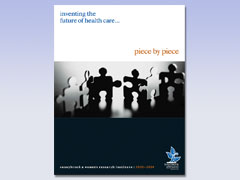By Accident
An accident started the ball rolling. In the 1970s, doctors in Brazil mistakenly injected a small amount of highly concentrated saline solution into a patient in shock and found it stabilized blood pressure.
It was great news. For a while, many believed this concentrated solution, called hypertonic saline, was the ideal resuscitation fluid for trauma patients. But further study revealed that stabilization of blood pressure had no effect on survival. Oops. The clinical use of hypertonic saline was abandoned.
But a recent 27-person clinical trial led by Dr. Sandro Rizoli, director of trauma research at SWRI, hints that hypertonic saline may be an effective treatment after all.
In the mid-1990s, when Rizoli was beginning his doctoral studies in Toronto, research was starting to suggest that hypertonic saline could regulate the immune system in non-human models, a result that may improve long-term survival of trauma victims.
Recent advances to the care offered to patients immediately after an accident means that many more survive initial hemorrhage. Now, Rizoli explains, "If you are involved in a car accident, chances are you will not die from the initial trauma itself, but from multiple organ failure weeks later in the intensive care unit. Hemorrhage is not the direct cause of death but it often results in organ failure."
After major trauma, particularly when the body goes into shock, the immune system mounts a huge inflammatory response. Ironically, the very means that the body uses to protect itself backfires and causes organs to shut down. Therefore, if you can regulate the inflammatory response of the immune system, you may increase long-term survival.
Remembering the excitement that hypertonic saline provoked in Brazil and seeing the clinical need first-hand, Rizoli threw himself into the subject.
Interest in hypertonic saline is exploding. Building on Rizoli's small study funded by Defense Research and Development Canada, another 100-person trial led by scientists at St. Michael's Hospital and Sunnybrook & Women's, including Rizoli, is looking for definitive answers as to whether hypertonic saline can prevent organ failure in trauma patients. A larger National Institutes of Health trial involving 10 centres across North America is planned to start soon after.
Rizoli's fascination with hypertonic saline stems not only from the impact it could have clinically but also how it exemplifies the winding path that discovery takes. The accidental eureka in Brazil in the 1970s led to laboratory work on model systems in the 1990s, which is now provoking this new spate of clinical trials.
"It started as a clinical problem, then became basic science, and we are now moving back to the bedside, this time with a different premise: modulating inflammation and preventing patients from developing multiple organ failure," he marvels.
This often complicated interplay between laboratory science and clinical care is what drives Rizoli to juggle a busy schedule as both a trauma surgeon and researcher. "I think there are two motivators to do basic science: an interest in understanding things, and the hope that one day you are going to apply it to patients," he says. "And hypertonic saline is a beautiful combination of both."
PDF / View full media release »





